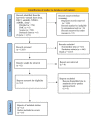Some Twist of Molecular Circuitry Fast Forwards Overnight Sleep Hours: A Systematic Review of Natural Short Sleepers' Genes
- PMID: 34722012
- PMCID: PMC8547374
- DOI: 10.7759/cureus.19045
Some Twist of Molecular Circuitry Fast Forwards Overnight Sleep Hours: A Systematic Review of Natural Short Sleepers' Genes
Abstract
This systematic review focuses on different genetic mutations identified in studies on natural short sleepers, who would not be ill-defined as one type of sleep-related disorder. The reviewed literature is from databases such as PubMed, PMC, Scopus, and ResearchGate. Due to the rare prevalence, the number of studies conducted on natural short sleepers is limited. Hence, searching the search of databases was done without any date restriction and included animal studies, since mouse and fly models share similarities with human sleep behaviors. Of the 12 articles analyzed, four conducted two types of studies, animal and human (cross-sectional or randomized-controlled studies), to testify the effects of human mutant genes in familial natural short sleepers via transgenic mouse or fly models. The remaining eight articles mainly focused on one type of study each: animal study (four articles), cross-sectional study (two articles), review (one article), and case report (one article). Hence, those articles brought different perspectives on the natural short sleep phenomenon by identifying intrinsic factors like DEC2, NPSR1, mGluR1, and β1-AR mutant genes. Natural short sleep traits in either point-mutations or single null mutations in those genes have been examined and confirmed its intrinsic nature in affected individuals without any related health concerns. Finally, this review added a potential limitation in these studies, mainly highlighting intrinsic causes since one case study reported an extrinsically triggered short sleep behavior in an older man without any family history. The overall result of the review study suggests that the molecular mechanisms tuned by identified sleep genes can give some potential points of therapeutic intervention in future studies.
Keywords: adrb1; dec2; familial natural short sleeper; mglur1; natural short sleeper; npsr1; short sleep.
Copyright © 2021, Yook et al.
Conflict of interest statement
The authors have declared that no competing interests exist.
Figures




Similar articles
-
Beyond the black stump: rapid reviews of health research issues affecting regional, rural and remote Australia.Med J Aust. 2020 Dec;213 Suppl 11:S3-S32.e1. doi: 10.5694/mja2.50881. Med J Aust. 2020. PMID: 33314144
-
Familial natural short sleep mutations reduce Alzheimer pathology in mice.iScience. 2022 Mar 15;25(4):103964. doi: 10.1016/j.isci.2022.103964. eCollection 2022 Apr 15. iScience. 2022. PMID: 35496999 Free PMC article.
-
Testing an early online intervention for the treatment of disturbed sleep during the COVID-19 pandemic (Sleep COVID-19): structured summary of a study protocol for a randomised controlled trial.Trials. 2020 Aug 8;21(1):704. doi: 10.1186/s13063-020-04644-0. Trials. 2020. PMID: 32771068 Free PMC article.
-
Sleep Extension in Short Sleepers: An Evaluation of Feasibility and Effectiveness for Weight Management and Cardiometabolic Disease Prevention.Front Endocrinol (Lausanne). 2018 Jul 18;9:392. doi: 10.3389/fendo.2018.00392. eCollection 2018. Front Endocrinol (Lausanne). 2018. PMID: 30072950 Free PMC article. Review.
-
Public sector reforms and their impact on the level of corruption: A systematic review.Campbell Syst Rev. 2021 May 24;17(2):e1173. doi: 10.1002/cl2.1173. eCollection 2021 Jun. Campbell Syst Rev. 2021. PMID: 37131927 Free PMC article. Review.
References
Publication types
LinkOut - more resources
Full Text Sources
Research Materials
